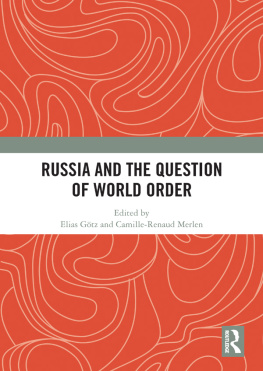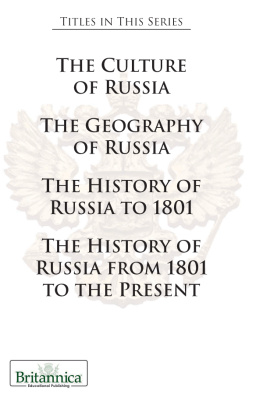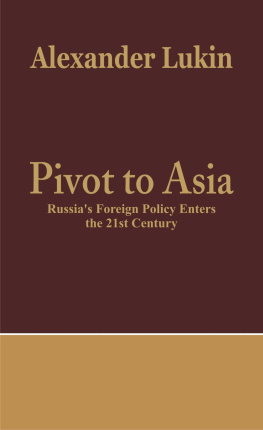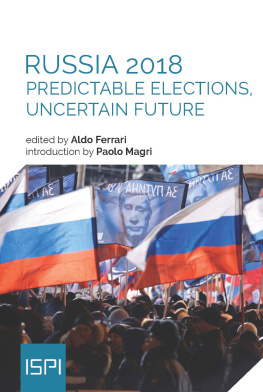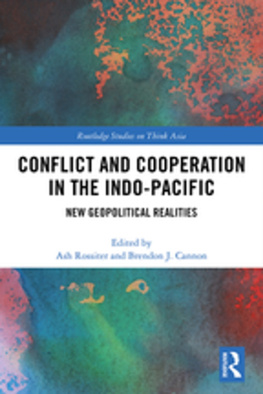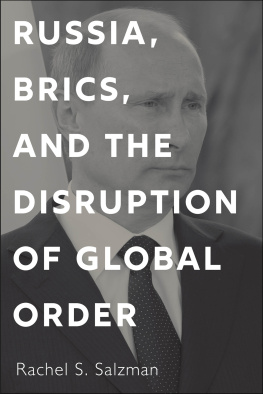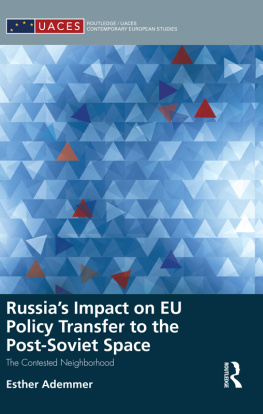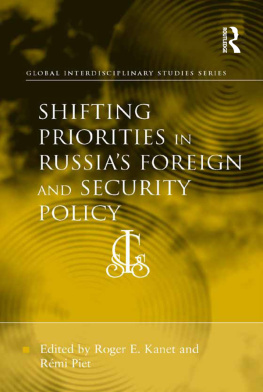Russia and the Question of World Order
Russia and the Question of World Order engages with three sets of questions that cut to the heart of the ongoing debate about Russias role in the present world order.
First, what are Russias aims and objectives? Is Russia a highly revisionist power bent on overturning established rules and institutions, or is it best understood as a country with limited ambitions? Second, what factors shape Russias views on the global order and its foreign policy choices? And finally, what are the consequences of Russias actions for the existing international order? To answer these questions the book brings together scholars who analyse Russias approach to world order through different theoretical lenses, including the English School, E.H. Carrs classical realism, social constructivism, and a long dure perspective.
Examining Russias role in the present world order, with a special focus on Moscows relations with the US, China, and the EU, Russia and the Question of World Order will be of great interest to scholars of international relations and Russian foreign policy.
The chapters were originally published as a special issue of European Politics and Society.
Elias Gtz is a Researcher at the Institute for Russian and Eurasian Studies at Uppsala University, Sweden. He has published on Russian foreign policy in journals such as International Studies Review, Foreign Policy Analysis, and International Politics.
Camille-Renaud Merlen is a PhD Candidate at the School of Politics and International Relations at the University of Kent, Canterbury, UK. He researches Russian conceptions of sovereignty, including Russias engagement with supranational courts.
Russia and the Question of
World Order
Edited by
Elias Gtz and Camille-Renaud Merlen
First published 2020
by Routledge
2 Park Square, Milton Park, Abingdon, Oxon, OX14 4RN
and by Routledge
52 Vanderbilt Avenue, New York, NY 10017
Routledge is an imprint of the Taylor & Francis Group, an informa business
Chapters 3-6 2020 Taylor & Francis
Chapter 1 2018 Elias Gtz and Camille-Renaud Merlen. Originally published as Open Access.
Chapter 2 2018 Tuomas Forsberg. Originally published as Open Access.
With the exception of , please see the chapters Open Access footnotes.
Trademark notice: Product or corporate names may be trademarks or registered trademarks, and are used only for identification and explanation without intent to infringe.
British Library Cataloguing-in-Publication Data
A catalogue record for this book is available from the British Library
ISBN13: 978-0-367-42555-5
Typeset in Myriad Pro
by codeMantra
Publishers Note
The publisher accepts responsibility for any inconsistencies that may have arisen during the conversion of this book from journal articles to book chapters, namely the inclusion of journal terminology.
Disclaimer
Every effort has been made to contact copyright holders for their permission to reprint material in this book. The publishers would be grateful to hear from any copyright holder who is not here acknowledged and will undertake to rectify any errors or omissions in future editions of this book.
Contents
Elias Gtz and Camille-Renaud Merlen
Tuomas Forsberg
Kevork K. Oskanian
Roger E. Kanet
Marcin Kaczmarski
Zachary Paikin, Kaneshko Sangar and Camille-Renaud Merlen
The chapters in this book were originally published in European Politics and Society, volume 20, issue 2 (April 2019). When citing this material, please use the original page numbering for each article, as follows:
Chapter 1
Russia and the question of world order
Elias Gtz and Camille-Renaud Merlen
European Politics and Society, volume 20, issue 2 (April 2019) pp. 133153
Chapter 2
Russia and the European security order revisited: from the congress of Vienna to the post-cold war
Tuomas Forsberg
European Politics and Society, volume 20, issue 2 (April 2019) pp. 154171
Chapter 3
Carr goes east: reconsidering power and inequality in a post-liberal Eurasia
Kevork K. Oskanian
European Politics and Society, volume 20, issue 2 (April 2019) pp. 172189
Chapter 4
Russian strategic culture, domestic politics and Cold War 2.0
Roger E. Kanet
European Politics and Society, volume 20, issue 2 (April 2019) pp. 190206
Chapter 5
Convergence or divergence? Visions of world order and the Russian-Chinese relationship
Marcin Kaczmarski
European Politics and Society, volume 20, issue 2 (April 2019) pp. 207224
Chapter 6
Russias Eurasian past, present and future: rival international societies and Moscows place in the post-cold war world
Zachary Paikin, Kaneshko Sangar and Camille-Renaud Merlen
European Politics and Society, volume 20, issue 2 (April 2019) pp. 225243
For any permission-related enquiries please visit:
http://www.tandfonline.com/page/help/permissions
Tuomas Forsberg is a Professor of International Relations at the University of Tampere, Finland. He is on leave of absence August 2018August 2023 at the Helsinki Collegium for Advanced Studies.
Elias Gtz is a Researcher at the Institute for Russian and Eurasian Studies at Uppsala University, Sweden. He has published on Russian foreign policy in journals such as International Studies Review, Foreign Policy Analysis, and International Politics.
Marcin Kaczmarski is a Lecturer in Security Studies, School of Social and Political Sciences, University of Glasgow, UK. His research interests include Russia-China relations, Russias foreign policy, great-power regionalism, rising powers, peaceful change in international politics, and the role of domestic politics in foreign policy.
Roger E. Kanet is a Professor Emeritus of Political Science at the University of Miami, Coral Gables, USA, and Professor Emeritus at the Russian, East European, and Eurasian Center at the University of Illinois at Urbana-Champaign, USA.
Camille-Renaud Merlen is a PhD Candidate at the School of Politics and International Relations at the University of Kent, Canterbury, UK. He researches Russian conceptions of sovereignty, including Russias engagement with supranational courts.
Kevork K. Oskanian is a Lecturer in Political Science and International Studies at the Centre for Russian, European and Eurasian Studies at the University of Birmingham, UK. He convenes the postgraduate modules Diplomacy and Statecraft and International Relations Theory.
Zachary Paikin is a PhD Candidate at the School of Politics and International Relations at the University of Kent, Canterbury, UK. He has been a published columnist for several Canadian media outlets; has contributed research to think tanks in Canada, the United States, and the United Kingdom; and is an editor at the international affairs magazine Global Brief.
Kaneshko Sangar was awarded his PhD Russia and the international struggle around Afghanistan 20012012 from University College London, UK. He has over 15 years of experience in consultancy and research, international development/NGO, higher education/teaching, and hospitality, and has worked in Russia, Ukraine, Afghanistan, Pakistan, Central Asia (Tajikistan, Uzbekistan, and Kazakhstan), the Netherlands, Germany, and the United Kingdom.

